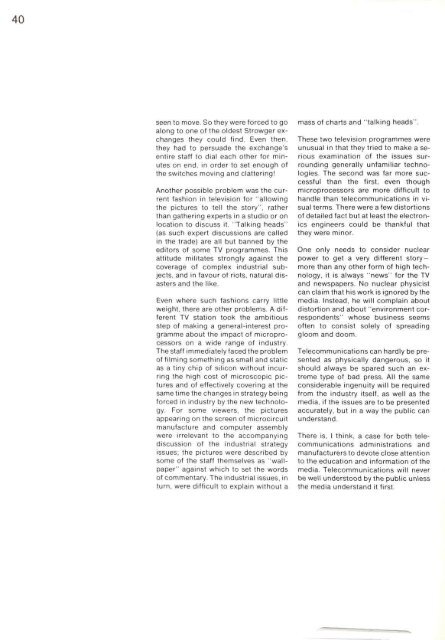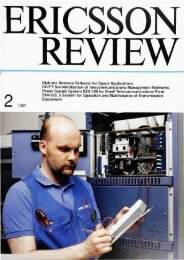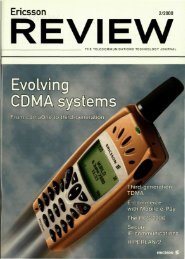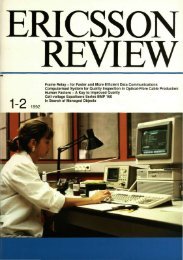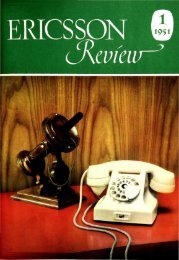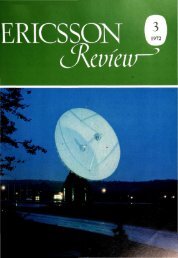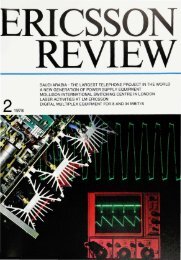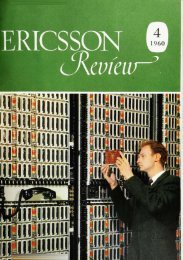ericsson review - ericssonhistory.com
ericsson review - ericssonhistory.com
ericsson review - ericssonhistory.com
You also want an ePaper? Increase the reach of your titles
YUMPU automatically turns print PDFs into web optimized ePapers that Google loves.
40<br />
seen to move. So they were forced to go<br />
along to one of the oldest Strowger exchanges<br />
they could find. Even then,<br />
they had to persuade the exchange's<br />
entire staff to dial each other for minutes<br />
on end, in order to set enough of<br />
the switches moving and clattering!<br />
Another possible problem was the current<br />
fashion in television for "allowing<br />
the pictures to tell the story", rather<br />
than gathering experts in a studio or on<br />
location to discuss it. "Talking heads"<br />
(as such expert discussions are called<br />
in the trade) are all but banned by the<br />
editors of some TV programmes. This<br />
attitude militates strongly against the<br />
coverage of <strong>com</strong>plex industrial subjects,<br />
and in favour of riots, natural disasters<br />
and the like.<br />
Even where such fashions carry little<br />
weight, there are other problems. A different<br />
TV station took the ambitious<br />
step of making a general-interest programme<br />
about the impact of microprocessors<br />
on a wide range of industry.<br />
The staff immediately faced the problem<br />
of filming something as small and static<br />
as a tiny chip of silicon without incurring<br />
the high cost of microscopic pictures<br />
and of effectively covering at the<br />
same time the changes in strategy being<br />
forced in industry by the new technology.<br />
For some viewers, the pictures<br />
appearing on the screen of microcircuit<br />
manufacture and <strong>com</strong>puter assembly<br />
were irrelevant to the ac<strong>com</strong>panying<br />
discussion of the industrial strategy<br />
issues; the pictures were described by<br />
some of the staff themselves as "wallpaper"<br />
against which to set the words<br />
of <strong>com</strong>mentary. The industrial issues, in<br />
turn, were difficult to explain without a<br />
mass of charts and "talking heads".<br />
These two television programmes were<br />
unusual in that they tried to make a serious<br />
examination of the issues surrounding<br />
generally unfamiliar technologies.<br />
The second was far more successful<br />
than the first, even though<br />
microprocessors are more difficult to<br />
handle than tele<strong>com</strong>munications in visual<br />
terms. There were a few distortions<br />
of detailed fact but at least the electronics<br />
engineers could be thankful that<br />
they were minor.<br />
One only needs to consider nuclear<br />
power to get a very different storymore<br />
than any other form of high technology,<br />
it is always "news" for the TV<br />
and newspapers. No nuclear physicist<br />
can claim that his work is ignored by the<br />
media. Instead, he will <strong>com</strong>plain about<br />
distortion and about "environment correspondents"<br />
whose business seems<br />
often to consist solely of spreading<br />
gloom and doom.<br />
Tele<strong>com</strong>munications can hardly be presented<br />
as physically dangerous, so it<br />
should always be spared such an extreme<br />
type of bad press. All the same<br />
considerable ingenuity will be required<br />
from the industry itself, as well as the<br />
media, if the issues are to be presented<br />
accurately, but in a way the public can<br />
understand.<br />
There is, I think, a case for both tele<strong>com</strong>munications<br />
administrations and<br />
manufacturers to devote close attention<br />
to the education and information of the<br />
media. Tele<strong>com</strong>munications will never<br />
be well understood by the public unless<br />
the media understand it first.


